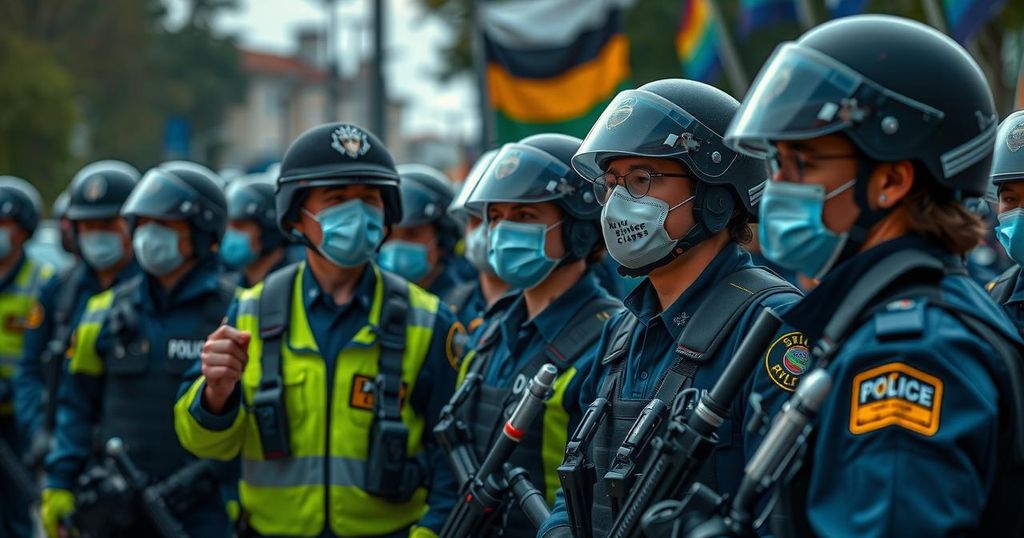COP29 is currently underway in Azerbaijan, where experts express concerns about the effectiveness of the climate conference amid the host nation’s promotion of fossil fuels. Key figures like Professor Johan Rockström and Ban Ki-moon criticize the summit as unfit for purpose, pointing to significant contradictions between the COP’s mission and the actions of its leaders. Without reform, the meetings risk becoming mere formalities rather than driving necessary climate action.
As COP29 unfolds, many experts express skepticism regarding its efficacy, with Professor Johan Rockström and prominent figures such as former UN Secretary General Ban Ki-moon voicing serious concerns. They argue that the conference is now inadequately equipped to address climate challenges, especially as it takes place under the auspices of a nation like Azerbaijan, which continues to champion fossil fuels. Recent statements from Azerbaijan’s leadership show a dismissive attitude toward criticisms of their oil and gas industries, with President Ilham Aliyev dubbing natural gas a “gift from God.” These remarks have raised doubts about the commitment of host nations to the COP’s original mission: to combat climate change and implement sustainable solutions. Concerns also stem from Azerbaijan’s Deputy Energy Minister, Elnur Soltanov, who was caught on video discussing the potential to leverage the negotiations for oil deals during the summit. Rockström criticized such statements, indicating they undermine COP’s foundational intention, which should focus on climate resolutions rather than fossil fuel agreements. The tension between the actual aims of the summit and the actions of its hosts raises significant questions. This contradiction is reflective of more profound issues witnessed in previous conferences like COP28, which also faced scrutiny for being influenced by oil-producing nations, exemplifying a trend toward commercialization of what was once an earnest climate dialogue. Despite the presence of more than 65,000 attendees in Azerbaijan, the atmosphere is perceived as one of performative engagement rather than genuine action. Analysis indicates that a substantial number of participants have affiliations with fossil fuel industries, further complicating the legitimacy and effectiveness of the negotiations. While some activists assert that the presence of polluting industries needs to be curtailed to ensure the integrity of such summits, Rockström maintains that engagement with oil-producing countries is necessary. He emphasizes that clear goals and accountability are crucial to catalyzing real action towards climate change mitigation. Further illustrating the disconnect is the stark reality of the promises made at previous summits, particularly COP21, which initiated the legally binding Paris Agreement. Despite ambitious goals to limit global temperature rise to 1.5 degrees Celsius, current trends suggest that 2024 could see unprecedented high temperatures. Achieving these goals necessitates consistent annual reductions in greenhouse gas emissions, a target Rockström believes remains elusive due to the lack of transformative commitment evident at COP meetings. He articulates a pressing need for decisive action, denouncing the gradualist approach that has pervaded climate discussions over the past three decades. Ultimately, the contrasting behaviors displayed at the ongoing COP meetings and the growing urgency of the climate crisis indicate a critical junction. While Rockström recognizes the necessity of fostering global collaboration to overcome these challenges, he expresses disappointment in the pace of progress and asserts that a radical overhaul of the conference format and goals is essential. Only then may the COPs fulfill their fundamental role as vehicles for sincere climate action, rather than spectacles dominated by political posturing.
COP (Conference of the Parties) is the primary international forum for addressing climate change, established after the United Nations Framework Convention on Climate Change (UNFCCC) went into effect in 1994. Over the years, COP meetings have aimed to bring together nations to negotiate binding agreements aimed at reducing greenhouse gas emissions and tackling the drivers of climate change. However, recent criticisms highlight a growing concern that the conferences may have devolved into mere ceremonial events rather than effective arenas for dialogue and action. Azerbaijan, as the host for COP29, represents a particularly contentious example due to its significant fossil fuel interests and its leadership’s promotion of those industries, presenting a challenge to the integrity of climate negotiations.
To conclude, COP29 exemplifies the challenges facing the international climate dialogue, particularly when hosted by nations with vested interests in fossil fuels. The contrasting statements from Azerbaijan’s leadership and the emerging trends suggest a pivotal need for reforms to restore the integrity and effectiveness of COP meetings. Expert critiques underscore that without a serious commitment to transformative actions and accountability, the goals of the COP, particularly regarding climate change mitigation, are unlikely to be realized. As time runs short for meaningful interventions, the urgency remains for global leaders to align their negotiations with the scientific imperatives needed to address the impending climate crisis.
Original Source: www.telegraph.co.uk






